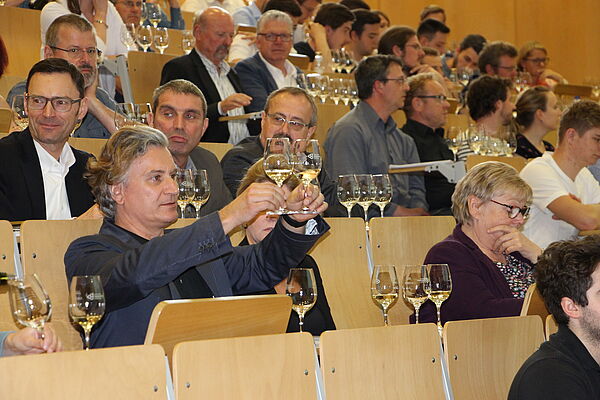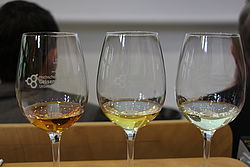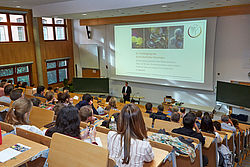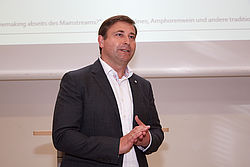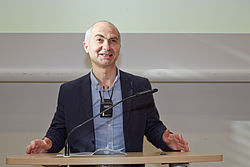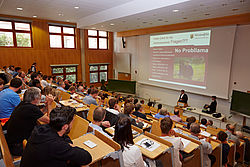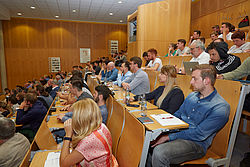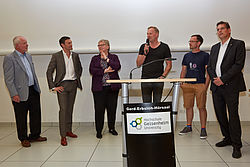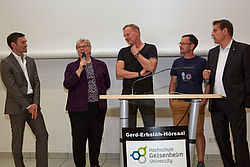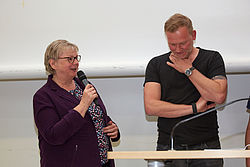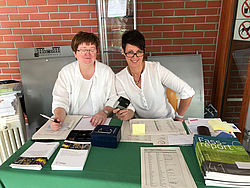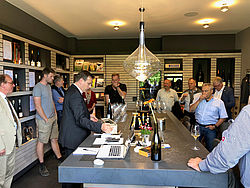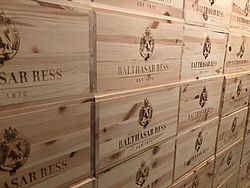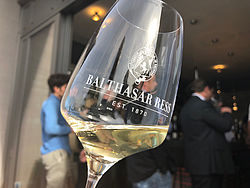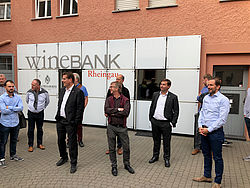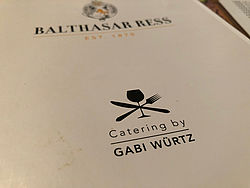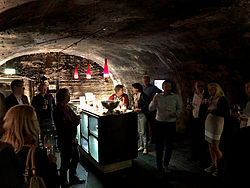As we all know, enologist are the winemakers. In this connection, the word "making", here describing human influence in the wine-making process, plays an important role. Although it is common knowledge that the quality of a wine is created in the vineyard or, in other words, actually "made" there, the anthropogenic influence is of decisive importance. The aim is to preserve this quality from the cellar to the consumer or to analyse and optimize it even further. For this purpose, good technical practice provides a number of physical, biological and chemical means. Every enologist uses this repertoire to create his/her own wine compositions - we talk about modifying enology to different extents. However, almost no consumer knows how the wine would have tasted in its "orginal version". Exactly this is the reason why the Bund Deutscher Oenologen (BDO, Association of German Enologists) decided to enter new or rather old paths with this year´s symposium. Under the slogan "Winemaking out of Mainstream: Natural Wines, Amphora Wines and Other Traditional Enological Methods" the BDO held its 61st BDO Symposium at Hochschule Geisenheim University on April 24, 2018.
After the welcome speech by BDO President, Prof. Dr. Erik Schweickert, Prof. Dr. David Chichua of the Agrarian University of Tiflis presented the enological method of making amphora wines and explained the advantages and disadvantages of qveri wines. "Qvevri is an egg-shaped earthenware vessel with a capacity of 50 to 4,000 liters which is buried in the ground. The optimum size is between 1,000 and 1,500 liters. It is formed by hand from a mixture of clay, loam and sand, air-dried and then kilned at a temperature of approximately 1,100°C. Most of them are coated with beeswax inside. When we talk about qvevri wine we usually think of a mash-fermented white wine. However, there are also other types of wine in Georgia; so, also red wines are vinified in qvevris, but pressed immediately after fermentation is complete. Very often qvevri wines are made organically, but there are also conventional winemakers who use selected yeasts," Chichua explained. He also pointed out that this tradition has now been used for 8,000 years, emphasizing that absolutely healthy grapes were the most important prerequisite for making good qvevri wines. "Qvevris, which cost around 50 euro cent per liter of capacity, can last for around 100 years or even longer if they are properly made," Chichua added. Amphora wines will also be the main focus of the Caucasus excursion planned by the BDO for summer this year.
Prof. Dr. Otmar Löhnertz, who was obviously pleased with the full lecture hall, reported, among other topics, about the planned project of building a new lecture hall complex as well as about possible advanced education programs in cooperation with BDO.
Dr. Oliver Schmidt of the Staatliche Lehr- und Versuchsanstalt für Wein- und Obstbau (State Education and Research Institute for Viticulture and Pomology), Weinsberg had a detailed look at the so-called natural wines and classified them as wines with very little or no human input. And who is interested in natural wines? "These are experts who are interested in unusual wines and definitely in their intrinsic message. For them, natural wines are wine ambassadors made organically or even biodynamically. These wine experts want to buy wines that are ONLY made from grapes," Schmidt said. And who makes such natural wines? "This is a challenge taken on by (organic) winemakers. They want to act in such a clever and perfect way both in the vineyard and the cellar that allows them to use simple and traditional methods without additives, without filtration and often with SO2 (addition) in order to make tasty, stable and attractive wines for their customers," the expert added.
Carsten Wipfler of the Landesuntersuchungsamt Rheinland-Pfalz, Institut für Lebensmittelchemie (Institute of Food Chemistry), Speyer had a closer look at the natural wines from a wine inspection point of view and stated that the biggest problem in the designation of natural wines was to be found in the name itself, since under the wine law of 1971 it is not allowed to use the term "natural" for labeling or advertising. Wipfler emphasized that natural wines very often struggled with being recognized as quality wines since, in order to receive the official approval number, they have to meet the requirement of absolute clearness. However, if there are no distinct wine faults to be seen, they are assessed as tradeable ordinary table wines by the wine inspection authority. "Currently, there is huge movement and innovation in the field of natural wines. Should these wines stop being just niche products, it would be helpful to introduce regulations tailored to these wines. Our denomination law based on general EU provisions and the prohibition of the term "natural" is not suited for these products. A big shortcoming is also the fact that precise geographical indications are not allowed. Applying for a protected designation of origin for natural wines could perhaps be a first approach to solving this problem," said Wipfler who also made sure that the audience was aware of the fact that Orange Wine is to be considered as a "white wine".
Sascha Speicher, editor-in-chief of meiningers sommelier published by Meininger Verlag scrutinized natural wines from the perspective of the wine market. He pointed out that for consumers natural wines meant one way of expressing their philosophy of life as they do with vegan food as well, and that in the hipster community there was no way around it. "Those who want to impress in trendy wine shops and wine bars as well as in restaurants in cities such as New York, Berlin and Tokyo do not have any chance at all if they do not show a certain affinity for natural wines," Speicher said. According to him orange wines should be recognized as a new type of wine. He also thinks that young wineries can only compete in the high-priced wine sector if they add natural wines to their product range and that all those who prefer "classic wine styles" would at least have to prove that they use biodynamic methods.
A rather exaggerated but not entirely serious panel discussion titled „Wine Unplugged – A Distinction or just a Topic for Wackos“, then allowed an intense and controversial exchange of ideas. So, for example, Prof. Dr. Monika Christmann expressed her opinion that natural wines were an insolence since this would mean that all other wines were not natural products. Ms Christmann who holds a Professorship for Enology at Hochschule Geisenheim and who is President of the Internationale Organisation für Rebe und Wein, OIV (International Organization for Vine and Wine) clearly pointed out that natural wines were a niche product and that a legal regulation covering mash-fermented white wines would surely come soon. Wolfgang W. Schaefer considered the new trend as positive arguing that while sales numbers decreased in classic wine markets, natural wines opened up new markets. The fact that drinking orange wines was trendy could only be seen as a good development for the wine market. Dirk Würtz, Operations Manager of the VDP winery Balthasar Ress who has been dealing with the topic of orange and natural wines for more than 15 years and who has pioneered these wines in Germany, commented, "Those who think that this is just a trend that will soon be over again are completely wrong. This movement involves inspiration!“ Christmann added new arguments saying that it was time to think about means of becoming outstanding at an international level and to focus more on regionality and typicity. "Without any doubt, amphora wines typically belong to Georgia,“ the OIV President said.
Finally, the topic was "uncorked" within the scope of a wine tasting under the slogan „A Self-Test between Euphoria and Conquest“ which was moderated by Johannes Burkert and Jo Wessels and which gave room for discussing the question whether Wine Unplugged is better suited for differentiation or for putting off customers.
This year´s symposium was rounded off by a visit to the winery Balthasar Ress in Hattenheim allowing participants to have a look at the WINE Bank, followed by an evening program with a wine tasting presented by Christian Ress.
It was an informative conference beyond the standards of enology that provided the opportunity for a fundamental discussion in an enological context without ideological blinders but also without ideological delusion. Even though BDO does not at all stand for "Bist Du Orange" (are you orange), there is a reason why orange and amphora wines as well as natural wines are of a certain importance as niche markets. And since consumers are always open for new experiences, there will certainly be a market for these wines – allowing to dip into very old traditions, but also to experience more original products and also other taste adventures.
Tina Kissinger

